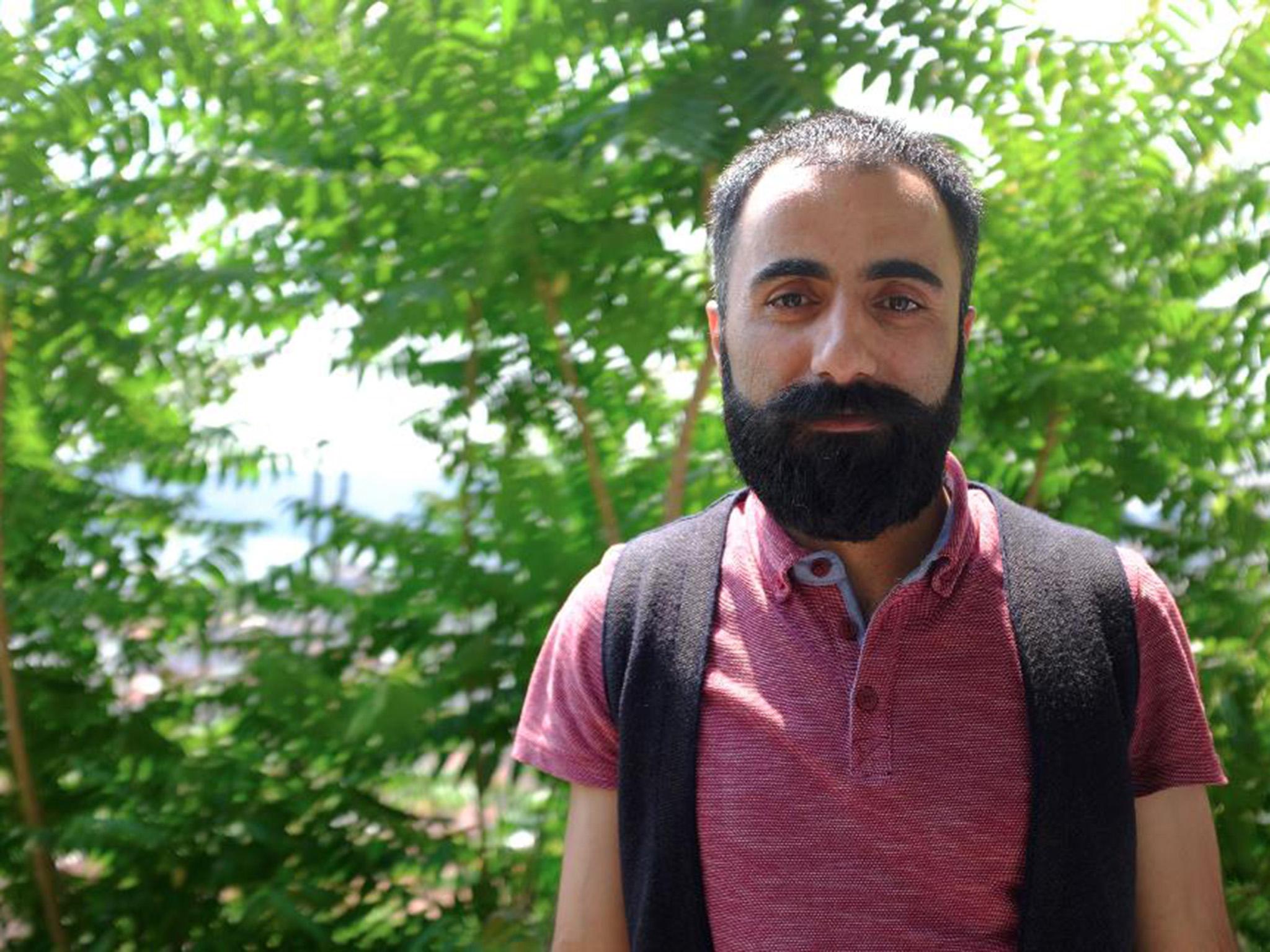Fired Kurdish workers retaliate against Turks and open small businesses
From hunger strikes to independent entrepreneurship, more than 150,000 people fired from their jobs on suspicion that they were involved in Turkey’s last coup attempt are resisting the strong arm of the state in their own way

Your support helps us to tell the story
From reproductive rights to climate change to Big Tech, The Independent is on the ground when the story is developing. Whether it's investigating the financials of Elon Musk's pro-Trump PAC or producing our latest documentary, 'The A Word', which shines a light on the American women fighting for reproductive rights, we know how important it is to parse out the facts from the messaging.
At such a critical moment in US history, we need reporters on the ground. Your donation allows us to keep sending journalists to speak to both sides of the story.
The Independent is trusted by Americans across the entire political spectrum. And unlike many other quality news outlets, we choose not to lock Americans out of our reporting and analysis with paywalls. We believe quality journalism should be available to everyone, paid for by those who can afford it.
Your support makes all the difference.In the centre of where various pedestrian cobble stone streets meet, in the hip and relatively progressive suburb of Kadıköy, Istanbul, Serdar Bascitin sits with a humble smile, surrounded by posters displaying his cause.
Bascitin and the people surrounding him are showing their support for their friends in Ankara, who started the hunger strike at the start of March. “We want the government to hear our voice so they can return our friends to their jobs and they can finish the hunger strike,” Bascitin said, clearly worried about his friend’s health. “It is at a very critical point.”
After the coup in July 2016, the Turkish state enforced a state of emergency and issued a decree enabling nearly 150,000 people to be fired from their jobs. Since the 16 April referendum this year, President Recep Erdoğan gained greater parliamentary powers enabling an extra 4,000 people to be dismissed.
Those fired are supposedly connected with terrorist organisations. Though, as Amnesty International Turkey researcher Andrew Gardener, mentions, there is no “individual justification or any evidence presented”.

Bascitin used to be a research assistant at a university in Erzincan before he was fired on 29 October, 2016. He said the government has paid no notice of the hunger strike’s message, “instead they have attacked the area and arrested people.”
Nuriye Gülmen and Semih Özakça are the remaining two teachers still on hunger strike, despite being in prison. On July 31, and the 144th day of no food, the pair were forcibly taken to the prison’s hospital.
Bascitin believes he was fired as he was one of the Academics for Peace who signed a proclamation against the civilian killings in the east of Turkey. “We wanted them to stop because little babies and women were being killed in great numbers. We have nothing to do with the coup and they know this,” Bascitin said, compassionately.
Gardener explains the Turkish state doesn’t draw a line between legitimate and illegitimate oppositions to the government. “The story of Turkey is this massive intolerance of dissent,” he said.
For many of the people fired, it is more than just a job for them. “I miss being with my students; I love them. Teaching is what I was raised for and this is what I want to do for my whole life and now I’m doing nothing,” Bascitin expresses.
A change of pace
While Bascitin needed to move back in with his family as he couldn’t afford rent, Serap Kılıç doesn’t have this option. “I’m afraid I will be blamed for being one of the PKK [Kurdistan Workers' Party] or a supporter of Fetullah Gülen (accused by the government of orchestrating the coup),” she said.
Kılıç explained that many people she knows couldn’t return to their families because they wouldn’t accept them. So instead, she stayed in the east. “My adventure starts in Diyarbakir,” Kılıç said, with a radiating face.

Kılıç had been working in the government for eight years and was a member of a trades union among the Confederation of Public Employees Trade Unions (KESK). She was fired on December 29, 2016. Of the total number of people fired, 3,400 belonged to KESK.
Now, you will find Kılıç in her own mezze restaurant in the main street of Diyarbakir. Sitting down eating Irmik, a homemade, creamy semolina pudding, she tells the story of her new venture. She opened Kadin Elp Mezze in March 2017. The name means Woman Hand, and is co-owned with another woman also fired from the government.
Kılıç had a small amount of savings she used to start the business. “I couldn’t go to university, couldn’t be a civil servant and I can’t work for private places because I’m labelled as a terrorist,” Kılıç explains. She isn’t earning too much now, each day is just in balance, “but I’m resisting against the government,” she said strongly.
When she was fired, Kılıç filed an application to the court, though the government rejected it. “It is against the constitution and law,” she said, explaining she has now applied to the European Court of Human Rights. Up until now there has been no legal remedy for anyone fired.
Generally, in Turkey, the option for those dismissed in the public sector is to open a case with the administrative court. “The courts are saying this isn’t an administrative decision though, considering they’ve passed a law with people names in it and they can’t look at it,” Gardener explains.
Kılıç is positive about her change of lifestyle. Seeing as she wasn’t a frontline teacher, she thinks her situation was different. “I’m not missing the job, it was a robotic lifestyle, now my life is more colourful.”
She mentions she has a lot of support from people in the area who were in the same position as her. “Sometimes it’s hard because I’m tired, but when people say ‘I’m proud of you’, I get my energy back.”
There seems to be a strong resistance among all the people fired. “When they fired us and took our jobs, they thought they were going to make us dishonourable, but we aren’t going to let this happen. Eventually we’re going to win, we know that.” Kılıç believes the system makes her tougher. “It makes us anarchists,” she said with a laugh.
Embracing Kurdish roots
Rifat Yıldız was fired from his teaching job in Muş on October 29, the same day the decree was issued for Bascitin. “I miss the children a lot. I don’t care about the system but I miss the children,” he said emotively.
Soon after, Yıldız moved to Istanbul as he didn’t feel comfortable in his hometown. “I felt like a hunted one.” His other drive to move was his need to find a job in order to support he and his family. Yıldız was lucky to be a part of an education union called Egitim Sen, who provided him with 2,000 TRY per month, though it is now reduced to 1,700 TRY per month.
Yıldız is responsible for six people in his family. He is also looking after two nephews while his brother is in jail. “He was labelled as a terrorist,” Yıldız tells a common story. “I think all Kurds are seen to be potential terrorists, that’s why every day I’m waiting to be arrested and put in jail.”
Finding a job is going to be difficult for Yıldız, just like many of the others who were fired. Recently he attended a job interview in a restaurant. “Everything was ok at the beginning, the boss said come tomorrow and start,” Yıldız said.

Though once the conversation turned to what he was doing prior to Istanbul, Yıldız needed to explain he was fired. “The boss said he couldn’t hire me anymore. He said he really wants to but it’s impossible for him, because of the government.” Yıldız explains that this is a situation he may face multiple times.
To make ends meet for now, Yıldız is giving private Kurdish lessons in Istanbul. “The pay is not that much, I can feed only myself with that money.”
Yıldız believes teaching Kurdish is important to keep culture alive. Many Kurds don’t speak Kurdish due to the assimilation policies introduced with the creation of the Republic of Turkey. The language is also forbidden in the school curriculum.
On December 15, 2015 Yıldız participated in a hunger strike, protesting the government’s actions in Kurdistan, relating to the war in places like Sur, Diyarbakir. “They used this as an excuse for firing me,” he said. Still, Yıldız sees himself as being in a better situation, compared to many people who were fired. “I hope this situation can be changed as soon as possible,” he said.
Amnesty researcher Gardener states the government planned to create a commission to assess the fired workers cases in January 2017, though members were only appointed in mid May. Officially, work commenced in July though it is not clear whether cases have started to be examined or not.
Yıldız believes “it’s a game the state is playing. They are just trying to prevent it from being opened in the European Court of Human Rights.” He points to only seven people working in the commission compared with more than 100,000 people fired. “Even if they take two hours with each person, it will take more than three years to complete.”
The issue of independence from the government is also a problem. Gardener said the people who have been appointed are those who fired the people in the first place. He believes the best mechanism to deal with the situation would be to set up commissions in each province of Turkey. That would minimise the time taken to process and also appoint people with no connection to the state civil service.
Yıldız doesn’t have much hope this will happen though. “Independence is a dream now in Turkey.”
Join our commenting forum
Join thought-provoking conversations, follow other Independent readers and see their replies
Comments